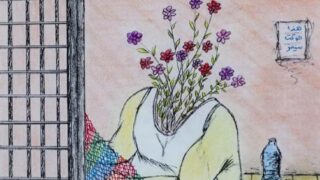
This publication has benefited from the support of the Rosa Luxemburg Foundation. This text may be reproduced in part or in full, provided the source is acknowledged.
The Conference of the Parties on Climate Change (COP27), which was held in Sharm el-Sheikh in November 2022, ended with the establishment of a Loss and Damage Fund for the first time since the Paris Agreement of 2015. However, the achievement is not enough in light of the absence of some countries and the reservations expressed by others about setting a timetable to phase out the use of fossil fuels, especially coal, with the aim of attaining net-zero by 2050.
Meanwhile, industrial countries have been pushing for funding adaptation and mitigation programs to cover up their enormous emissions which have been altering the face of the planet. And while the Secretary-General of the United Nations, Antonio Guterres, declared “zero-tolerance for greenwashing” practiced by major industrial states, he also announced the launch of a $3.1 billion plan to achieve early warning systems, in seemingly contradictory and ambiguous statements. Should we wait for COP28, which will be held in the petrostate of the United Arab Emirates, in order to make agreements in favor of ending the use of fossil fuels?
An empty fund
“I’m here because I'm angry. My communities have already been impacted by an ongoing drought for the past decade. My people have not seen any rain for the past ten years. Their livelihoods are being impacted already,” said Ina Maria Shikongo, an indigenous activist from Namibia in West Africa. The continent as a whole, which has hosted the COP27 in Egypt, is the most affected by climate change. Shikongo made the statement during a sit-in organized by dozens of civil society organizations at the end of COP27, in an attempt to pressure world leaders to work towards a much-needed climate justice.
The difficult negotiations among the parties extended the conference for more than a day and ended at dawn in Cairo with an important decision whose credibility and applicability will be tested in the coming few months. For the first time since the Paris Agreement, a Loss and Damage Fund was established to help vulnerable countries hit hard by climate change. However, the fund’s financing, mechanisms, and way of determining and ranking vulnerable countries all remained vague.
The UN Framework Convention on Climate Change (UNFCCC) lacks a precise definition of loss and damage. However, it generally refers to the economic and non-economic losses resulting from climate change. The 2022 report of the Intergovernmental Panel on Climate Change (IPCC) (1) mentions four points: they are the result of global warming; they will continue to increase in the future; they are unjustly distributed among countries; and the existing financial, administrative and institutional arrangements do not address all aspects of losses and damages.
Following the announcement of the Loss and Damage Fund, China refused to make promises to contribute to financing it, while implying that it is, in fact, one of the affected countries, accusing the European Union and the United States of America of trying to pressure emerging economies to bear the brunt of the historical damages of climate change that date back to the industrial revolution. On the other hand, the EU demanded during the COP27 sessions to reclassify China as a potential donor and not as a developing country, and to hold it accountable for its share of emissions.
Climate Change: It’s About Time!
29-12-2022
The Struggle for Climate Justice in the Arab Region
21-01-2023
By the end of the negotiations, the EU, fearing that the biggest burdens would fall on it, expressed several reservations concerning the Fund’s financing, after having been one of its biggest proponents. On the other hand, US President Joe Biden’s pledge to contribute to the Fund pends the results of Congress voting. But the biggest challenge facing the Fund is calculating the financial losses today, not those of 1992 when the UNFCCC was signed nor those of 2015, because the annual $100 million grants stipulated by the Paris Agreement are no longer sufficient to mitigate the effects of climate change.
Civil society organizations, minorities, women and youth organizations, and the Alliance of Small Island States (AOSIS) all spoke unapologetically during the COP27. Their stances pressured the host country, Egypt, and the president of the conference, the Egyptian Foreign Minister Sameh Shoukry, to work harder on developing several aspects of the Loss and Damage Fund during the final negotiations; knowing that Egypt is one of the countries vulnerable to the effects of climate change and lacking in the capabilities and tools that allow their mitigation.
For the first time since the Paris Agreement, a Loss and Damage Fund was established to help vulnerable countries hit hard by climate change. However, the fund’s financing, mechanisms, and way of determining and ranking vulnerable countries all remained ambiguous.
Egypt also made a number of important initiatives at the summit, including a plan to accelerate decarbonisation under the five key sectors of power, road transport, steel industry, hydrogen production and agriculture, in addition to launching the Food and Agriculture for Sustainable Transformation Initiative (FAST), to improve the quantity and quality of climate finance contributions to the agricultural and food sectors by 2030. The UN website described the initiative as the first to address the climate impacts of agricultural emissions.
Egypt had prepared well for the summit, seeking tangible results and making significant efforts with the help of its climate experts. However, a press conference held by Sanaa Seif, the sister of the detained activist Alaa Abdel-Fattah, during the events of the climate summit, presented another perspective. Sanaa demanded the release of her dissident brother, who was in prison on hunger strike at the time, and her speech was a lesson for the authorities on the importance of opening the public sphere for free speech, which is inherently consistent with the values and notion of climate justice.
Financiers
The early draft of the COP27 cover decision upheld several controversial recommendations such as “limiting global warming to 1.5°C,” which requires “rapid, deep and sustained reductions in global greenhouse gas emissions,” through reducing the production and use of fossil fuels. Meanwhile, the cover decision has been criticized for failing to make any breakthroughs, having only reformulated past goals and fallen short of setting a timetable to phase out fossil fuels to achieve net-zero carbon by 2050.
Greenpeace has accused Saudi Arabia, one of the largest oil-producing countries and chair of the Arab Coordinating Group (AGC), of obstructing the climate negotiations, but Saudi Arabia has not yet commented on this statement. Alongside China, Saudi Arabia expressed reservations during the discussions on eliminating the use of fossil fuel. In addition, the presidents of China, India, and Russia were absent from the climate summit.
Meetings adjourned, and the Loss and Damage Fund was still empty. The newly-established transitional committee is expected to make recommendations on how to operationalize the fund and its mechanisms by COP28. The first meeting of the transitional committee is expected to take place before the end of March 2023. However, it seems all steps that are being taken to protect the planet and limit the damage are slow and hesitant, especially with regard to funding.
Industrial countries have been pushing for funding adaptation and mitigation programs to cover up their enormous emissions which have been altering the face of the planet. Meanwhile, the Secretary-General of the United Nations, Antonio Guterres, declared “zero-tolerance for greenwashing.”
A study (2) published by the German foundation Heinrich Böll proposes allocating $150 billion annually to the Loss and Damage Fund, provided that these contributions increase to reach between $290 and $580 billion by 2030, noting that the Paris Agreement proposed an annual $100 billion fund; a commitment which has never been met.
The United Nations Environment Program (UNEP) stated in the Adaptation Gap Report 2022 (3) that international adaptation finance flows to developing countries are 5 to 10 times below estimated needs and “the gap is widening.” By 2030, annual adaptation needs are expected to reach $340 billion annually, and $565 billion by 2050.
The World Bank stated in a report (4) that its group delivered a record $31.7 billion in fiscal year 2022 to help countries address the problem of climate change. The amount is a 19% increase the $26.6 billion delivered in 2021; however, it does not exceed 21% of the funding proposed by Heinrich Böll’s study.
One proposed source of financing the Loss and Damage Fund is taxing major oil and gas companies, which have very little regard for climate change warnings. A study by Urgewald Group (5) revealed that 96% of the oil and gas companies are expanding, while many financial institutions and banks continue to make oil-related investments, including those of them who have signed pledges to work towards a net-zero target.
“I’m here because I'm angry. My communities have already been impacted by an ongoing drought for the past decade. My people have not seen any rain for the past ten years. Their livelihoods are being impacted already,” said Ina Maria Shikongo, an indigenous activist from Namibia in West Africa. The continent as a whole, which has hosted the COP27 in Egypt in 2022, is the most vulnerable to climate change.
The study located the largest fossil fuel exploration companies in Africa, which number 23 out of 200 companies covered by the research. Out of these 23 top investors, 14 are headquartered in the US, 6 in Europe, 1 in Canada, 1 in India and 1 in South Africa, and they are developing or exploring new fossil reserves in 48 out of 55 African countries. Heffa Schücking, Director of Urgewald, revealed during the COP27 that the amount allocated to explore fossil fuels in Africa amounts to $5 billion, which she considered a complete waste, given the continent’s potential to implement massive alternative energy projects.
Adaptation and mitigation
During the meetings of the summit, former US Vice President Al Gore said that Africa could be the “renewable energy superpower” in the world, noting that “the continent has 40% of the entire world’s potential for renewables. The potential for solar, wind and hydropower is 400 times larger than total fossil fuel reserves.”
Al Gore attended the previous COP as an environmental activist, where he presented, with the support of the UN Secretary-General, the data collected by the Climate TRACE Coalition’s Methane and Carbon Emissions Detector from 70,000 locations around the world. Gore did not disclose whether this data warranted fines or penalties.
One proposed source of financing the Loss and Damage Fund is taxing major oil and gas companies, which have very little regard for climate change warnings. A study by Urgewald Group revealed that 96% of the oil and gas companies is expanding, while many financial institutions and banks continue to make oil-related investments, including those of them who have signed pledges to work towards a net-zero target.
This system is important for tracking methane gas emissions, responsible for about 30% of global warming since pre-industrial times. The main sources of methane emissions are fossil fuels, waste, and agriculture. A UN study (6) confirmed that human-caused methane emissions, which have been tracked since the 1980s, are increasing faster than ever.
But are the parties responsible for tracking impartial? Most likely not. The Climate TRACE Coalition website mentions that the primary source of data on emissions is highly dependent on a network with the European Space Agency and the US Space Agency (NASA).
‘Adaptation and mitigation’ is the other face of the coin when it comes to combating the effects of climate change, along with the Loss and Damage Fund. These are two strategies of addressing the problem. Mitigation refers to human interventions to reduce the emissions of greenhouse gases by sources or enhance their removal from the atmosphere by “sinks,” while adaptation is an adjustment in natural or human systems in response to actual or projected climatic stimuli or their effects, which moderates harm. According to the UN, “3.5 billion people live in countries highly vulnerable to climate change.”
During the meetings of the summit, former US Vice President Al Gore, said that Africa could be the “renewable energy superpower” in the world, noting that “its potential for solar, wind and hydropower is 400 times larger than total fossil fuel reserves.”
During the COP27, the United Nations announced the ‘early warning’ initiative as part of the mitigation and adaptation strategies to forecast, track, and respond to disaster, disseminate early warnings, and mobilize initial investments worth $3 billion between 2023 and 2027.
Some experts have criticized the use of the terms ‘mitigation and adaptation’ as a way to avoid discussing policies of extraction and fossil fuel use. Instead, the kind of solutions that were discussed between political elites, scientists and climate change experts focused on the cheapest ways to reduce emissions, according to the glossary of climate change terminology provided by Latin America and the Caribbean Platform for Climate Justice (7).
The tracking system is important for monitoring methane emissions, responsible for about 30% of global warming since pre-industrial times; the main sources of which are fossil fuels, waste, and agriculture. A UN study confirmed that human-caused methane emissions, which have been tracked since the 1980s, are increasing faster than ever.
This was how the COP27 discussions went. Most suggestions engaged in adaptation and mitigation policies and the Loss and Damage Fund and steered clear of any confrontation with fossil fuel producing and consuming countries and those that practice extraction and undermine climate pledges, including the host country itself, Egypt.
The content of this publication is the sole responsibility of Assafir Al-Arabi and Rosa Luxemburg Foundation cannot accept any liability for it.
Translated from Arabic by Sabah Jalloul
Published in Assafir Al-Arabi on 01/12/2022
1- Intergovernmental Panel on Climate Change (IPCC), Annual Climate Change Report 2022. https://www.ipcc.ch/report/ar6/wg2/
2- Heinrich Böll Foundation, Spotlighting the Finance Gap. https://bit.ly/3jdlLPj
3- United Nations Environment Program (UNEP), Adaptation Gap Report 2022. https://bit.ly/3hDaFlZ
4- World Bank, Climate Finance Report for Fiscal Year 2022, https://bit.ly/3V6PO8D
5- Urgewald Group, A study entitled “Who is Financing Fossil Expansion in Africa?” 2022. https://bit.ly/3WcQCKw
6- United Nations, CCAC, Global Methane Assessment 2021. https://bit.ly/3G0l5Ws
7- Assafir Al-Arabi, Latin America and the Caribbean Platform for Climate Justice, Glossary of Climate Change Terminology 2022. https://bit.ly/3FBozxd






